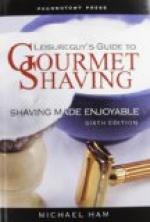“No,” she confessed, after a moment. “He did not write me that he thought it right to give Captain Hunniwell such a reference. In fact he wrote that he thought it all wrong, deceitful, bordering on the dishonest. He much preferred having Charles go to the captain and tell the whole truth. On the other hand, however, he said he realized that that might mean the end of the opportunity here and perhaps public scandal and gossip by which we all might suffer. And he said he had absolute confidence that Charles was not a criminal by intent, and he felt quite sure that he would never go wrong again. If he were still in active business, he said, he should not hesitate to employ him. Therefore, although he still believed the other course safer and better, he would, if Captain Hunniwell wrote, answer as I had asked. And he did answer in that way. So, you see,” she cried, eagerly, “He believes in Charles, just as I do. And just as you will when you know, Mr. Winslow. Oh, won’t you try to believe now?”
A harder-hearted man than Jed Winslow would have found it difficult to refuse such a plea made in such a way by such a woman. And Jed’s heart was anything but hard.
“Now, now, Mrs. Armstrong,” he stammered, “you don’t have to ask me that. Course I believe in the poor young chap. And—and I guess likely everything’s goin’ to come out all right. That Mr. What’s-his-name—er—Wright—no, Reed—I got read and write mixed up, I guess—he’s a business man and he’d ought to know about such things better’n I do. I don’t doubt it’ll come out fine and we won’t worry any more about it.”
“And we will still be friends? You know, Mr. Winslow, you are the only real friend I have in Orham. And you have been so loyal.”
Jed flushed with pleasure.
“I—I told you once,” he said, “that my friends generally called me ‘Jed.’”
She laughed. “Very well, I’ll call you ‘Jed,’” she said. “But turn about is fair play and you must call me ‘Ruth.’ Will you? Oh, there’s Babbie calling me. Thank you again, for Charles’ sake and my own. Good morning—Jed.”
“Er—er—good mornin’, Mrs. Armstrong.”
“What?”
“Er—I mean Mrs. Ruth.”
The most of that forenoon, that is the hour or so remaining, was spent by Mr. Winslow in sitting by the workbench and idly scratching upon a board with the point of the chisel. Sometimes his scratches were meaningless, sometimes they spelled a name, a name which he seemed to enjoy spelling. But at intervals during that day, and on other days which followed, he was conscious of an uneasy feeling, a feeling almost of guilt coupled with a dim foreboding.
Ruth Armstrong had called him a friend and loyal. But had he been as loyal to an older friend, a friend he had known all his life? Had he been loyal to Captain Sam Hunniwell?
That was the feeling of guilt. The foreboding was not as definite, but it was always with him; he could not shake it off. All his life he had dealt truthfully with the world, had not lied, or evaded, or compromised. Now he had permitted himself to become a silent partner in such a compromise. And some day, somehow, trouble was coming because of it.




